Christian Slater is in love with the Pope, he says. He is sitting in a hotel room in London, fighting off the jet lag that means he’s been up since 2am. “I can’t help it. I was watching his trip to New York on the news, when he met those kids in school and did such a beautiful job. I was like, ‘Aaah, that’s what we need – an infusion of love from a powerful man, wielding it nicely.’” Slater’s also in love with the woman he married two years ago, Brittany, who works for an auction house, whom he misses, sitting here in his handsome suit, a bit stubbly and with eyelids so pale, you want to put makeup on them. “We chatted on the phone when I couldn’t sleep,” he says, smiling. “She has such a good sense of humour.”
Recently, Slater took on a new job as a full-time father, his 16-year-old son Jaden having just moved in with him and Brittany in New York for the first time. His 14-year-old daughter lives with her mother. “I’m doing everything I possibly can to make him feel comfortable and safe,” the actor says proudly. “Making him breakfast every morning, figuring out different ways to cook bacon so he likes it.”
The thing about all this love, though, is that it’s new to Slater, and he’s terrified of losing it. Later, he will tell me that he is a 46-year-old liar who is desperate to go straight. Right now, though, he even has feelings for the moon: last week, he was in another hotel room in another country, watching the lunar eclipse on CNN – until he realised it was live, so he went out on to his balcony to stare at the sky and wonder if something bigger was at work out there. “Something going on,” he suggests, “a force.”
He likens it to the force that brought all the elements together for his new TV show, Mr Robot, already a critical hit in the US and soon to be streamed on Amazon Prime in the UK. It is a genuinely startling show, driven by timely ideas about wealth inequality, corporate evil and the 1%, with echoes of Anonymous and the Occupy movement, as well as elements of magic realism; you never quite know what is real and what is delusion. The writer, Sam Esmail, has said he was inspired by his Egyptian family’s experiences during the Arab spring. Slater plays Mr Robot, an anarchist ringleader of computer hackers who operate from the rickety old fairground on Coney Island, and who seek to bring down the world’s biggest conglomerate, Evil Corp.
“After having so many experiences that didn’t come together the way I might have liked them to, I know how rare it is for all the elements to unite,” Slater says, referring to his recent run of cancelled TV shows and films that bombed (his 2012 film Playback grossed just $264; before that, there were plenty of straight-to-DVDs). “It’s always a leap of faith, and you don’t want to get too close to anybody, because you don’t know how long you’re going to be working together. But of course you end up getting emotionally invested, because you’re a human being and you can’t cut yourself off. So when the show does fall into the zeitgeist, and the issues being discussed are particularly relevant, it’s just great.”
Slater has been pretending to be other people since he was nine. His father was an actor, too, his mother an agent; their son played a kid in a soap opera, then worked on Broadway and soon stopped going to school altogether. “I had tutors,” he says, “but education was just not a priority.” Which is why he went back to get his school-leaver’s qualification when he was 30, in a classroom in Los Angeles, “having sat down and written a list of all the things I felt insecure about”.
His father was a depressive schizophrenic, and family life was complicated. Nine is also the age at which Slater started drinking champagne and found what he has previously described as “a warm rush of centredness that came over me”. By 15, he was starring in The Name Of The Rose, opposite Sean Connery. Then followed the cult classic high-school movie Heathers, with Winona Ryder, Interview With The Vampire and True Romance.
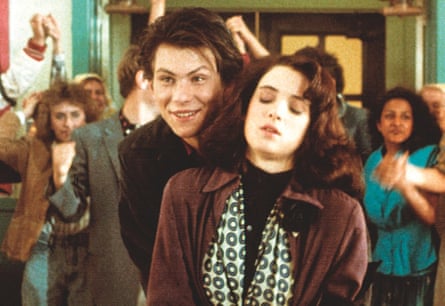
There was more fame, and trouble: drunk-driving car chases with the cops, a gun found in his luggage at JFK airport. In August 1997, he allegedly got high on tequila and cocaine, repeatedly punched a woman he was with, bit a man on the chest and attacked the police officers who came to arrest him. He said afterwards that he didn’t remember anything, but he did remember wanting to kill himself. “I remember walking out on the balcony on the fourteenth floor and having the thought go through my head,” he told Rolling Stone magazine the following year. He was sentenced to 90 days in prison for assault. In 2005, he was arrested again, for harassing a woman in the street, though charges were later dropped. (I have been warned by his publicist that Slater doesn’t want to talk about any of this: he has been sober for years. But it turns out later that he kind of does.)
Now that his son has moved in with him (because he feels “ready for some more independence, or maybe privacy”), he spends his afternoons helping with homework, because “he’s started at a new school a few blocks from where we live, and it’s a priority for me, and we want it to be a priority for him. I work on the English, history type stuff with him. And then, when my wife comes home from work, she can work with him for a considerable period of time on his math, because she has a real aptitude for it and I do not. But what’s funny is that my son – unless he’s totally fooling me – is completely the opposite of me, and I’m really grateful for that.”
So you don’t have to watch a replay of yourself?
“Yeah, that would be really difficult.”
I say something hypothetical about his son going out boozing and he shudders. “I certainly have to give credit to my ex-wife, in that she has done a phenomenal job, in creating a really sweet and lovely human being. I was just a walking hormone. That’s where my head was at and all I ever thought about. I had more the Howard Stern mentality.”
I ask about the rumour that he was too shy, during the making of Heathers, to let Winona Ryder know he had a crush on her. He looks at me as if I’ve missed a memo somewhere, and his hand starts to cover his mouth. “I mean, I definitely… let her know. Sure I did! I was 17, just hormones and ego. And the sense of invincibility that comes with that.
“Look,” he says, removing his hand, “you know, I used to be crazy in one way, now I’m crazy in another. The pendulum swung in a whole other direction. When I’m in the kitchen, I don’t want anybody else in the kitchen. I have a system – and the system, it’s another form of insanity that has grabbed me. A healthier form of insanity.”
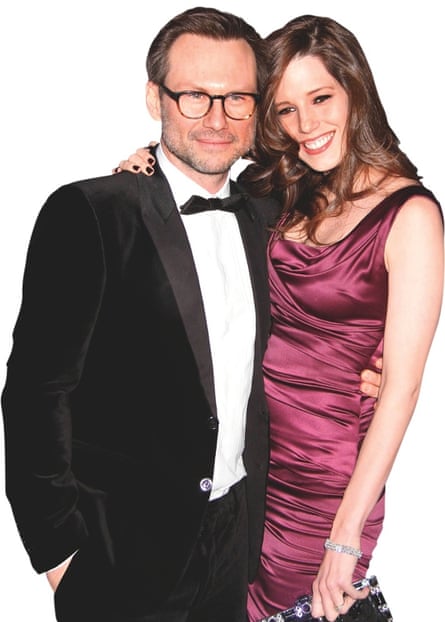
What he means is, he goes on YouTube to find the best way to cook bacon, and has discovered you can put it in the oven. “And my wife comes in saying, ‘What are you doing? You cook bacon on the stove’ and I go, ‘Yeah, but I saw this on the internet.’ I set it all up with foil in the tray the night before – I like to be prepared.”
He also walks the dogs around the block four or five times a day; he finds it helps him collect his thoughts. Still, he admits that all this stuff “is so not me. It’s funny that I’ve been doing these things. But I’m giving it a shot. It’s my real job now.” He reckons his wife is much smarter than he is. “I Forrest Gumped my way into it. But it does come down to the people you surround yourself with, and the suggestions that they make. And the suggestion might be, ‘We should go to that party!’ Or it might be, ‘Maybe you should try and read this book.’ It’s nice when you’re with the person who suggests the book, because it’s more relaxing, and it’s better for you than maybe going to hang out in some club or bar. There might have been a time in my life when I was like, ‘Yeurgh, the book is a horrible idea.’ And truthfully, it’s not always my first choice. But I try to go against my first instinct a lot of the time.”
So sobriety doesn’t change everything, just the one thing?
“Well,” he says, sighing, trying to answer with exactitude, “a person can get sober and definitely still be irresponsible and reckless. Drama can be an addiction. It’s so, so sneaky. Jealousy – all of those things can really send you in a lot of different crazy directions.” He sounds like a man who went for a walk up a hill one day only to find out it was a mountain range, and he’s still climbing it.
“So, I think I have set aside alcohol, but I haven’t set aside certain characteristics. Which might be… lying.”
He’s still lying?
“You know, trying to manipulate things. Acting like a baby at times. Catching yourself in those moments where it really does come down to those two roads. Do I want to go down the road that has led me to this one ending? Or try this other road, where I actually do just tell the truth? And be honest, and be brave in that particular moment.”
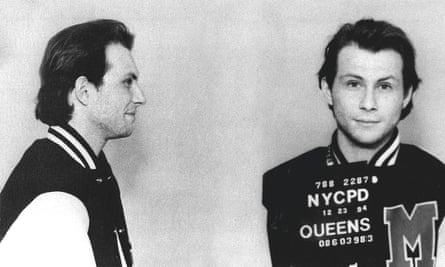
So that’s the kind of lying we’re talking about. “Not being true to yourself, yes. And all the other kinds of lying, too, if I’m going to be honest with you.”
Slater sounds his most authentic when he says this. “When you are drinking,” he continues, “and if you are, hypothetically, doing drugs, then I think lying is a natural extension of that. Because if you’re doing those things, there’s a possibility that you’re going to feel shame. You’re going to want to cover up and deny the things that happened the night before. So you’re certainly going to be lying to your parents, and then it becomes a habit.”
Was it a shock for him to find out that sobriety wasn’t the hardest bit of recovery?
“Yeah. Yeah! Because it can be very painful when emotions begin to surface that you’ve been stuffing down. Oh my God,” he says, more quietly, “it’s like, what? This doesn’t feel good. You don’t want to feel pain. You want to try to avoid pain as much as possible. And some people can avoid pain to the point where they end up not feeling anything any more – and they’re gone. I’ve certainly had friends, and people that I’ve been very close with, who weren’t necessarily able to handle it.” Slater was close to River Phoenix, who died of a drugs overdose in 1993.
“And it’s challenging, too, like when you’re travelling…” He looks around; I think he means right now, on this European press trip. “Wow,” he says, putting down his drink, “this coffee is really making me just spout a bunch of stuff. I’m just catching myself. But yeah! It can be very, very challenging.”
There is a certain tradition, among celebrities whose lives have gone in that direction, to say, “Yes, I used to be a drunken asshole, but now I’m sober.” What’s different, and likable, about Slater is that he’s only really saying that he used to be drunk, and now he’s working on not being an asshole.
I mention reading a rather tender conversation between him and Lars von Trier, who cast him in Nymphomaniac. Von Trier urged Slater to contact his father, after many years of not speaking. Did he? “Yeah, I communicated with my father and he’s all good. He’s very proud of me, and he loves me.” Slater nods, as if he feels compelled to say something positive. “I certainly appreciated Lars’s advice, absolutely. You know, before we did Nymphomaniac, I think his mother passed away, and he was dealing with a lot of emotional stuff that she sort of revealed on her deathbed.” He says he was immensely grateful that Von Trier cast him as the girl’s father in Nymphomaniac. “Not a part that anybody would have typically thought of me for. I don’t know, maybe people just thought… the bad boy aspect of it all, the reputation, all of that stuff. He gave me an opportunity to play someone who was not the reason for his daughter being fucked up. I was her safe haven, not the cause of her insanity.”
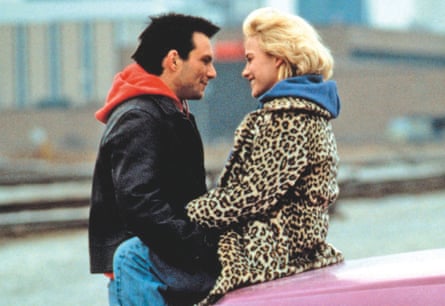
I ask if, having been a walking hormone, and described by Gawker in 2005 as “serial groper Christian Slater”, he is more of a feminist now. “Total feminist,” he says, laughing awkwardly. He brings up the equal pay issue his former co-star Patricia Arquette raised at the Academy Awards earlier this year. “That is obviously of vital importance,” Slater says. “It’s just frustrating that we live in a society that is slow to change. It’s like a big ship – it takes a long time for it to turn.”
He points out that even back in True Romance, a film full of guns and dealers, Arquette’s character “was certainly the instigator of a lot of the things that propelled the story along. There’s a scene where Patricia takes out James Gandolfini. And it wasn’t like I swooped in and saved the day. That was pretty far ahead of its time, for Quentin Tarantino to create a female character who was capable and didn’t need to be rescued.”
Speaking of slow ships, I ask how annoying it is to speak to people like me, who still want to hear about True Romance and Heathers, because I recently rewatched them both and they’re still utterly brilliant. Slater laughs a dry laugh. “Look, it was great, certainly, at the time. All the things that came along with it: good, bad, confusing. I’m certainly grateful that there were projects that I did that people responded to. It would be a nightmare if it were the other way around. But it’s sometimes a little disheartening.” He laughs again. “It’s like you kind of want to go, ‘God, that was so long ago.’ You’re not thinking about it, unless somebody brings it up. Or they come along and” – he does a comically fawning fan voice – “‘Oh, you were great in that show, I miss that show so much!’ and I go” – he adopts a sarcastic, gritted-teeth voice – “‘Thanks for bringing it up! I miss it, too.’”
The tide is turning now, though. “Instead of people yelling out, ‘Hey, Clarence Worley!’ they’re yelling out, ‘Hey, Mr Robot!’ So that’s nice. It’s extraordinarily difficult to find that, like I said.” Slater is enjoying his first taste of success in a long time, and doing his best to hold it together – choosing the right path, telling the truth. Not that it gets any easier. “We’re always going through a lot,” he says. “I can be going through nothing, but within me, in my head, oh my God! It can be a circus.”
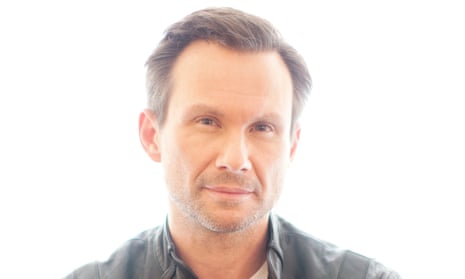
Comments (…)
Sign in or create your Guardian account to join the discussion